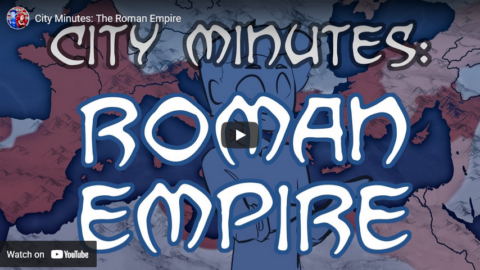Drachinifel
Published Feb 2, 2024Today we take a quick look at some of the maritime highlights of the new special exhibition at the British Museum about the Roman Legions:
https://www.britishmuseum.org/exhibit…
(more…)
May 13, 2024
Roman Legions – Sometimes found all at sea!
February 5, 2022
City Minutes: The Roman Empire
Overly Sarcastic Productions
Published 4 Feb 2022The funny thing about Empire is that ~*Rome*~ includes far more than just the City of Rome. Spread out across every corner of the Mediterranean — and then some — Roman Civilization was always adapting to local circumstances and changing over time. Today we’ll look at 5 cities that show the diversity of just how much “Rome” could really mean in the days of the empire.
The Great Cities In History by John Julius Norwich, “A Wonder of the World – Ephesus” from The Great Tours: Greece and Turkey, from Athens to Istanbul by John R. Hale, “Ephesus”, “Leptis Magna”, “Roman Britain”, “Pompeii” from World History Encyclopedia https://www.worldhistory.org/ephesos/, https://www.worldhistory.org/Lepcis_Magna, https://www.worldhistory.org/Roman_Britain, https://www.worldhistory.org/pompeii/. “Ephesus”, “Leptis Magna” “London”, “Pompeii” from Britannica https://www.britannica.com/place/Ephesus, https://www.britannica.com/place/Leptis-Magna, https://www.britannica.com/place/Lond…, https://www.britannica.com/place/Pompeii. I also have a degree in Classical Studies.
Chapters:
0:00 — Rome
0:58 — Ephesus
2:00 — Leptis Magna
3:03 — Londinium
4:12 — Pompeii
5:17 — ConclusionOur content is intended for teenage audiences and up.
PATREON: https://www.Patreon.com/OSP
PODCAST: https://overlysarcasticpodcast.transi…
DISCORD: https://discord.gg/osp
MERCH LINKS: http://rdbl.co/osp
OUR WEBSITE: https://www.OverlySarcasticProductions.com
Find us on Twitter https://www.Twitter.com/OSPYouTube
Find us on Reddit https://www.Reddit.com/r/OSP/
August 30, 2018
October 30, 2011
Using Pompeii as another stick to beat Berlusconi
Mary Beard debunks the widely reported story of yet another wall collapse in the archaeological remains of Pompeii:
By chance I am on the site of Pompeii for the weekend. It is now swarming with more journalists than tourists, and all (it seems) with a determination to hype another collapse, another Pompeian disaster. That is to say, they are here with a determined misunderstanding of what has just happened — or with a drive to use any damage to the site as a stick with which to beat Berlusconi.
Actually, I am usually quite happy to beat Berlusconi, but the fact is that this latest melodrama only serves to make the job much more difficult for those in the archaeological services here, who are doing their level best to keep the place up and running. (This weekend curators and other staff have been fielding tv crews, not getting on with the real job.)
So far as I can tell, what happened is this. There was an absolute downpour last night, in the course of which some stones were dislodged from a relatively fragile (and not very well built) stretch of wall near the Nola gate. A custode entered this damage rather loosely in the incident book — and (we can only speculate how and why) that report got to the press, and it soon became a new “wall collapse”. The carabinieri arrived and everything in the area (including, let me confess, where I want to go) was shut off.
Media folks are not trained archaeologists, so it’s easy to understand how a garbled report could be misunderstood — and that’s setting aside the urge to use any tool as a weapon against the current Italian prime minister. This is why media reports become less and less dependable as they try to report on more specific or more technical information: they lack the expertise and usually don’t take the time to get external experts to help them. (My favourite examples of this are when naval vessels larger than a rowboat are described as “battleships” and tracked military vehicles are invariably “tanks”.)
H/T to Tyler Cowen for the link.
November 10, 2010
Pompeii building collapse triggers calls for nationalization privatization
I never thought I’d read an article in the Guardian calling for the privatization of a state asset:
Opposition politicians and commentators accused Italy’s government of neglect and mismanagement today over the collapse of the 2,000-year-old House of the Gladiators in the ruins of ancient Pompeii.
Some commentators said the Unesco world heritage site should be privatised and removed from state control. La Stampa newspaper ran a story headlined “Pompeii — the collapse of shame,” echoing national opinion over the cultural disaster.
The stone house, on one of the site’s main streets and measuring about 80 sq m (860 sq ft), collapsed just after dawn yesterday while Pompeii was closed to visitors. The structure was believed to have been used as a club house by gladiators before they went to battle in a nearby amphitheatre.
[. . .]
“Precisely because it belongs to all humanity, its management should be taken away from a state that has shown itself incapable of protecting it,”
[. . .]
Approximately 2.5 million tourists visit Pompeii every year, making it one of Italy’s most popular attractions. Art historians and residents have for years complained that the sites were in a state of decay and needed regular maintenance. Two years ago the government declared a state of emergency for Pompeii but it lasted only a year.
Roberto Cecchi, under-secretary at the culture ministry, said there had been no effective, continuous maintenance at Pompeii in half a century. Breaking ranks with his ministry, he said stop-gap, ad hoc measures, such as the appointment of commissioners, which attracted flashes of publicity, were no substitute for the constant monitoring worthy of a world treasure.
To be fair, the Guardian is merely reporting on the calls for privatization, not explicitly endorsing them, but even that is shocking enough.




